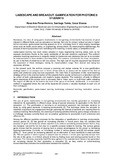Mostrar el registro sencillo del ítem
Labescape and breakout: gamification for photonics students
| dc.creator | Pérez Herrera, Rosa Ana | es_ES |
| dc.creator | Tainta Ausejo, Santiago | es_ES |
| dc.creator | Elosúa Aguado, César | es_ES |
| dc.date.accessioned | 2022-10-07T08:40:18Z | |
| dc.date.available | 2022-10-07T08:40:18Z | |
| dc.date.issued | 2021 | |
| dc.identifier.citation | Perez Herrera, R. A., Tainta Ausejo, S., & Elosua Aguado, C. (2021). Labescape and breakout. Gamification for photonics students. 2381-2387. https://doi.org/10.21125/edulearn.2021.0525 | en |
| dc.identifier.isbn | 978-84-09-31267-2 | |
| dc.identifier.uri | https://hdl.handle.net/2454/44193 | |
| dc.description.abstract | Nowadays, the idea of using game mechanisms in non-gaming environments has become of great interest in different fields such as education or training. Not only for primary school but also in higher formal education, game-based learning appears to be an emerging trend in wide-ranging knowledge areas such as health, social policy, or engineering, among others. By employing this methodology, the process of learning becomes more motivating while reaching, in some cases, a competitive level. Game-based learning has been widely adopted in many engineering learning areas, such as for example electronics thanks to the ready availability of low-cost electronic equipment. The authors' extensive teaching experience in subjects related to electronics and photonics has led us to consider its implementation in more ambitious teaching fields. For instance, and despite the broad acceptance, its use in the field of photonics is still very scarce. The high cost of required equipment has hindered the expansion of these strategies, taking its implementation longer than desired and being too expensive at times. In the present work, the authors propose a planning and design scheme for a new gamification strategy based on an escape-room in which, all the tests to be passed will be related to the field of optics and photonics using low-cost equipment. The main field of application of this novel teaching strategy will be in the practical section of the subjects that is usually carried out in a laboratory and will be aimed at both undergraduate and master's degree students. The resolution of tests in different game sequences of the escape room is proposed, that is, linear, open, or multi-linear paths, adapting the degree of difficulty of the tests to the level of the group of students. Additionally, a co-evaluation method is suggested where the rest of the students will provide a valuable feedback to each one of their colleagues. | en |
| dc.description.sponsorship | The financial support given by Electric, Electronic and Communication Engineering Department of Public University of Navarre is acknowledged. | en |
| dc.format.mimetype | application/pdf | en |
| dc.language.iso | eng | en |
| dc.publisher | IATED | en |
| dc.relation.ispartof | Gómez-Chova, L.; López-Martínez, A.; Candel-Torres, I. (Eds.): EDULEARN21 proceedings: 13th International Conference on Education and New Learning Technologies. IATED, 2021, 2381 - 2387, 978-84-09-31267-2 | en |
| dc.rights | Con permiso del editor | es_ES |
| dc.subject | Gamification | en |
| dc.subject | Game-based learning | en |
| dc.subject | Technology enhanced learning | en |
| dc.subject | Motivation | en |
| dc.subject | Serious game | en |
| dc.title | Labescape and breakout: gamification for photonics students | en |
| dc.type | Contribución a congreso / Biltzarrerako ekarpena | es |
| dc.type | info:eu-repo/semantics/conferenceObject | en |
| dc.date.updated | 2022-10-07T07:07:11Z | |
| dc.contributor.department | Ingeniería Eléctrica, Electrónica y de Comunicación | es_ES |
| dc.contributor.department | Ingeniaritza Elektrikoa, Elektronikoa eta Telekomunikazio Ingeniaritza | eu |
| dc.contributor.department | Institute of Smart Cities - ISC | es_ES |
| dc.rights.accessRights | Acceso abierto / Sarbide irekia | es |
| dc.rights.accessRights | info:eu-repo/semantics/openAccess | en |
| dc.identifier.doi | 10.21125/edulearn.2021.0525 | |
| dc.relation.publisherversion | https://doi.org/10.21125/edulearn.2021.0525 | |
| dc.type.version | Versión publicada / Argitaratu den bertsioa | es |
| dc.type.version | info:eu-repo/semantics/publishedVersion | en |
| dc.contributor.funder | Universidad Pública de Navarra / Nafarroako Unibertsitate Publikoa | es |


